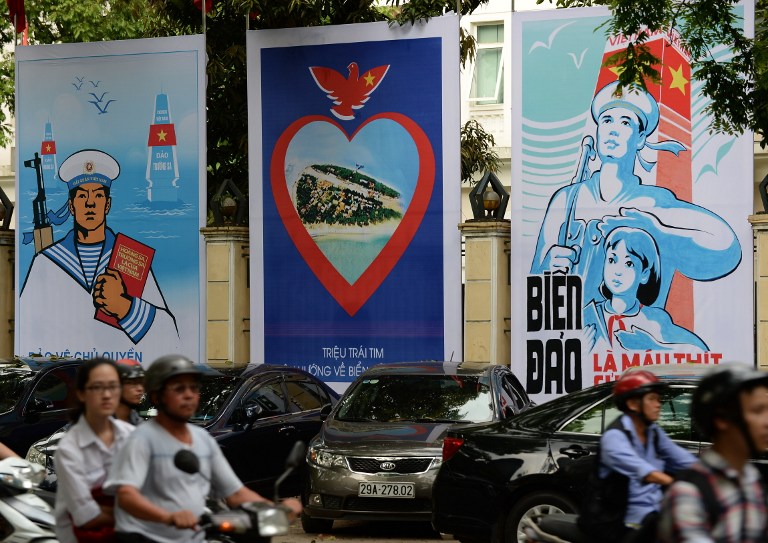Hanoi and Beijing on Tuesday accused one another of instigating a clash that led to the sinking of a Vietnamese fishing vessel in the South China Sea, where tensions have risen since China deployed an oil rig earlier this month near a chain of islands both nations lay claim to.
According to Vietnam, Chinese fishing boats encircled and rammed the wooden vessel, causing it to sink, while Beijing contends that the boat had tried to sail to the oil rig and had sunk after ramming a Chinese ship. The crew of 10 fishermen was rescued by Vietnamese patrol vessels in the area.
The incident occurred around 4:00 p.m. on Monday, in waters claimed by both countries some 17 nautical miles (27 kilometers) southwest of where Beijing deployed the oil rig near the disputed Paracel Islands on May 1 in a move that infuriated Hanoi and prompted violent anti-China protests across Vietnam.
Scores of ships from both sides are involved in a tense standoff over the rig, with several confrontations having occurred involving collisions and the use of water cannons, but Monday’s clash was the first to sink a boat.
Vo Van Trac, deputy head of Vietnam’s Fisheries Association, told RFA’s Vietnamese Service that Hanoi had lodged a formal complaint with Beijing over Monday’s clash, which he said took place in Vietnamese waters.
“Ten fishermen were rescued but the boat sank due to the collision by the Chinese vessel,” he said.
“We strongly condemn this. We have also … requested that China refrain from this type of action in the future and provide compensation for the Vietnamese fishermen…. This concerns the rights of our fishermen, so we must protect them by condemning China’s act and requesting compensation.”
Trac said that the Ministry of Foreign Affairs and other relevant agencies would “work with China accordingly” to resolve the matter, adding that Vietnamese authorities are advising fishermen to use caution when operating in the waters near the Paracels.
“But the most important thing is that China needs to stop these kinds of acts,” he said. “These waters belong to Vietnam and our fishermen have the right to fish there.”
In a statement Tuesday, Hanoi's foreign ministry spokesman Le Hai Binh called on China “to end inhumane acts that seriously infringed on the life, properties, and legitimate interests of Vietnamese fishermen, respect international law, strictly punish individuals concerned, prevent the reoccurrence of such acts, and satisfactorily compensate the affected Vietnamese fishermen.”
‘Unjustified disruption’
Beijing responded to Hanoi’s claims by saying that the Vietnamese fishing boat had attempted to “forcefully disrupt” the oil rig’s drilling operations and “capsized after ramming into the rear port side of a Chinese fishing ship that was operating nearby,” Chinese foreign ministry spokesman Qin Gang said at a press briefing.
“It is worth pointing out that the direct reason for this incident is that in spite of the repeated representations, warnings, and dissuasions from the Chinese side, the Vietnamese side continues to forcefully disrupt the normal drilling operations of the Chinese company and take dangerous actions,” he said.
“We urge the Vietnamese side once again to respect China's sovereignty, sovereign rights, and jurisdiction, stop immediately their disruptive and damaging activities—especially those dangerous actions at sea—and take concrete steps to safeguard navigation security and production order of the fishing industry.”
Qin said that the incident shows that Vietnam’s “unjustified and illegal disruption and destruction” of Chinese operations “will only end up harming their own interests.”
He also warned Vietnam, which has substantial economic ties to its northern neighbor, to “bear in mind the big picture of bilateral relations and regional stability.”
Qin said the rig had moved to a new location, but Vietnamese state media said it was still within what Hanoi considers its exclusive economic zone.
Relations tested
The South China Sea spat has seriously hampered relations between Hanoi and Beijing, and has also alarmed other countries in the region, including Japan, which is involved in its own territorial dispute with China in the East China Sea.
On Tuesday, Japanese government spokesman Yoshihide Suga called Monday’s incident an “extremely dangerous act,” according to a report by Agence France-Presse.
“It’s important that relevant countries abstain from unilateral actions that raise tensions and that the countries act cool-headedly, observing international laws,” AFP quoted Suga as saying.
Frustration over China’s deployment of the oil rig led to demonstrations by thousands of Vietnamese earlier this month, which Hanoi initially allowed a rare move widely seen as a way to amplify state anger against Beijing.
However, the government backpedaled after protests turned bloody, with riots targeting Chinese business interests. Beijing says four Chinese citizens were killed in the unrest, while Hanoi says three Chinese died.
Authorities in tightly controlled Vietnam have since arrested hundreds for their involvement in the riots, and two Vietnamese men on Sunday became the first to be jailed, receiving terms of one and three years.
China claims almost the entire South China Sea, rejecting rival claims from Vietnam, the Philippines, Taiwan, Malaysia, and Brunei.
Asian countries have been pushing China to agree to a code of conduct for about a decade to avoid conflicts in the South China Sea, which is known in Vietnam as the East Sea.
Reported by An Nguyen for RFA’s Vietnamese Service. Written in English by Joshua Lipes.
Hanoi, Beijing Trade Accusations Over South China Sea Sinking
Each blames the other for instigating a maritime clash that downed a Vietnamese fishing boat.

Motorists ride past propaganda billboards featuring Vietnam's determination to defend its coastal waters and islands, along a street in downtown Hanoi, May 27, 2014.